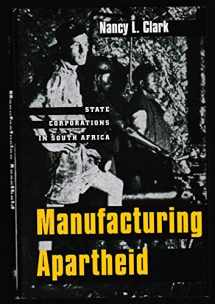
Manufacturing Apartheid: State Corporations in South Africa (Yale Historical Publications Series)
Book details
Summary
Description
In the early decades of the twentieth century, the South African government created state-owned corporations to develop a stable industrial base for white rule. These enterprises, which control electricity, steel, and the bulk of heavy industry, still exist today. This book examines the formation and evolution of these companies and the role they might now play in reshaping the country's battered economy and in better reflecting the changing realities of a new society.
Nancy L. Clark describes how state corporations were developed in South Africa to offset the economic dominance of the gold mining industry, to provide some autonomy from foreign producers, and to create jobs for Afrikaner workers. During their early operations in the 1920s and 1930s, however, in order to survive economically, the corporations had to depend on capital from the mining industry, forge marketing agreements, with foreign manufacturers, and hire cheaper African workers in place of whites - workers who became increasingly expensive to control and suppress. Through their struggles to balance the conflicting demands of the gold industry, the white political community, and the African workforce, the managers of the state corporations fashioned labor policies - the use of unskilled African labor and highly trained white technicians to oversee them - that were later borrowed by the architects of apartheid and that made the expansion of state-sanctioned racial discrimination economically feasible in the latter half of this century.


We would LOVE it if you could help us and other readers by reviewing the book
Book review



